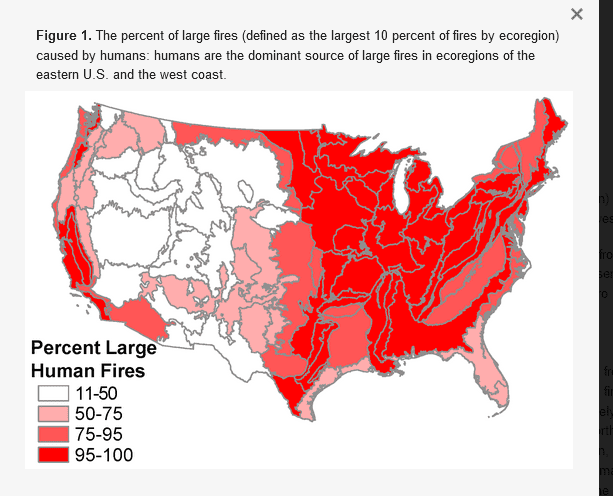Les’s article about Smokey Bear signage reminded me of this (2018) Nagy et al. paper. I read lots of climate media and papers and it is a given in some that “climate causes increased wildfires.” As we know, climate (or changes in weather over time) can certainly influence fire behavior, but so can fuel conditions, suppression strategies and tactics, and …. ignitions. This seems obvious, and more easily dealt with than decarbonizing global energy production, so it seems like something scientists would want to look at. We have seen fires start from power lines, people driving in dry grass, and people doing what appear to be really stupid things to celebrate events, and a variety of other causes. Many of these ignition sources have been the targets of behavioral change efforts via media, lawsuits or criminal charges. It seems like a likely topic for social scientists to look at.. what are all the human caused sources? What has worked in practice to reduce them?
Does anyone know of such studies?
From the paper:
Large Fire Seasonality
The seasonal expansion of large wildfires in the spring in the eastern U.S. (Figure 3a) was similar to the pattern of fires of all sizes [5], with many large human-caused fires occurring earlier in the year than large lightning-caused fires (Figure S6) and outside of the lightning fire season (Figure S7). Given the strong correlations previously identified between large fires and climate [3,18,34,49,56], we expected large fires across the U.S. to be more likely during dry, hot summer months in the western U.S. In the eastern U.S., the seasonality of large human-caused fires was highly correlated with the seasonality of human-caused fires of all sizes across most eastern ecoregions (Figure 4). These results suggest that seasonal climate does not play an important role in facilitating large fires in the East. Instead, ignition pressure is the primary driver of large fires in these ecoregions. This finding is consistent with [57], who showed that human ignitions are a more important driver of fire than climate in the eastern U.S. In the northwestern U.S., the seasonal correlation between large fires and all fires was lower (Figure 4), suggesting that climate conditions may play a more important role in facilitating large fires here. Nonetheless, even in ecoregions of the intermountain west where climate is known to influence large fires [2,12,56], human ignitions explained a substantial portion of the seasonal pattern of large fires (r > 0.66; Figure 4). This finding suggests that ignition pressure, and human expansion of ignitions [5], plays a much larger role in influencing large fires than previously thought.

I remember reading the Nagy etal paper when it was first published. Even when you look at the 2020 Labor Day fires in Oregon, those were overwhelmingly caused by people – unattended campfires, a suspected arsonist, downed powerlines, etc.
This has made me question some of the Wildfire Crisis reports coming out of the Forest Service – if you don’t understand the cause of the fires (which appear to be mostly human-related), how can you come up with a strategy to deal with those? I think that the recent additions to the Wildfire Crisis reports focusing more on protecting water sources and critical infrastructure are moving in the right direction. But the “problem” of people causing fires is a big one.
For awhile, I worked on a Ranger District that had an arsonist. The folks in the fire shop knew that the arsonist would be at work when there were specific weather conditions that promoted arsonist-lit fires taking off. And the route the arsonist used allow them to escape detection because they could drive up one road that was closest to town and then exit the woods out another road farther from town.
The arsonist was finally caught after some careful law enforcement work, but it was unnerving to know that someone was out there setting fires on purpose. After this particular arsonist was arrested and they looked at where they had lived and how that coincided with fires of suspicious origin over the previous 8-10 years in the western US – wow. That person had set a lot of fires.
“A Redding man was sentenced in federal court Monday after he was convicted of starting 11 fires on National Forest land, prosecutors say.”
https://krcrtv.com/news/local/redding-man-sentenced-for-starting-11-fires-on-national-forest-land-shasta-trinity-national-forest-arson-doj-federal-prison-forest-service